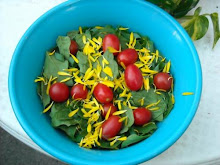 A few weeks ago, via text.
A few weeks ago, via text.Q. Can you grow tomatoes in part shade, or do they need a lot of sun? [paraphrased, as I've accidentally deleted the message]
A. Sorry, dude, tomatoes absolutely require a minimum of six hours of sun per day. No wiggle room. [Also paraphrased, and I seem to recall having used the words "boned," "screwed," or similar colorful euphemisms to describe his chances of getting a productive tomato harvest from the shady part of the yard]
More Info/Follow-Up: I have no idea why he was asking this; he grew great tomatoes in large containers on his (sunny) back porch last year, and has decided to do so again this year.
This question, whatever the inscrutable reasoning behind it, is a great example of some people's approach to gardening, especially in the early learning stages. They see that there's a little leeway between, say, full shade and part shade, or between "well drained soil" and not so well drained soil. They note that some plants survive through a light frost, and some even through a moderate freeze. They see experienced gardeners walk these fine lines with fair or even good results.
They assume, therefore, that the guidelines are arbitrary and mostly put there to annoy them. That's when the trouble starts.
"I put all eleven of my basil plants out early and they were doing great, but we had a few cool nights and now they're all dying of black spot fungus. The plants must have been defective!" (been there, done that)
"Can't understand why the marigolds and argeratum aren't doing well out back. Trees? Well, yeah, I guess I do have a few trees. And a bridge. And a some tall buildings. Why do you ask?" (guilty)
"Well, I dug down far enough to plant the rose bush, and maybe a little wider than the root ball, but I didn't feel like hacking through all that clay so I sort of stuffed it in and threw some dirt back around it. Is that why it looks like that?" (Only once! And it was a crappy rose bush to begin with. Really it was.)
Yes, experience and experimentation are absolutely the best way to learn! The question is: how many plants do you want to kill for each lesson? You can (briefly, partially) cheat Mother Nature. You can phone it in, you can half-ass it, you can make it up as you go along . . . but trust me when I tell you that you will have infinitely better results if you educate yourself about what conditions are best for which plants, and then make good use of that information.
In the interim, I should warn you that the rest of us are taking it in shifts to walk past your sad, straggly tomato plants, your drooping basil, and your dead flowers and mutter a few words of sympathy. We assure them you'll learn. We're not sure they believe us.


